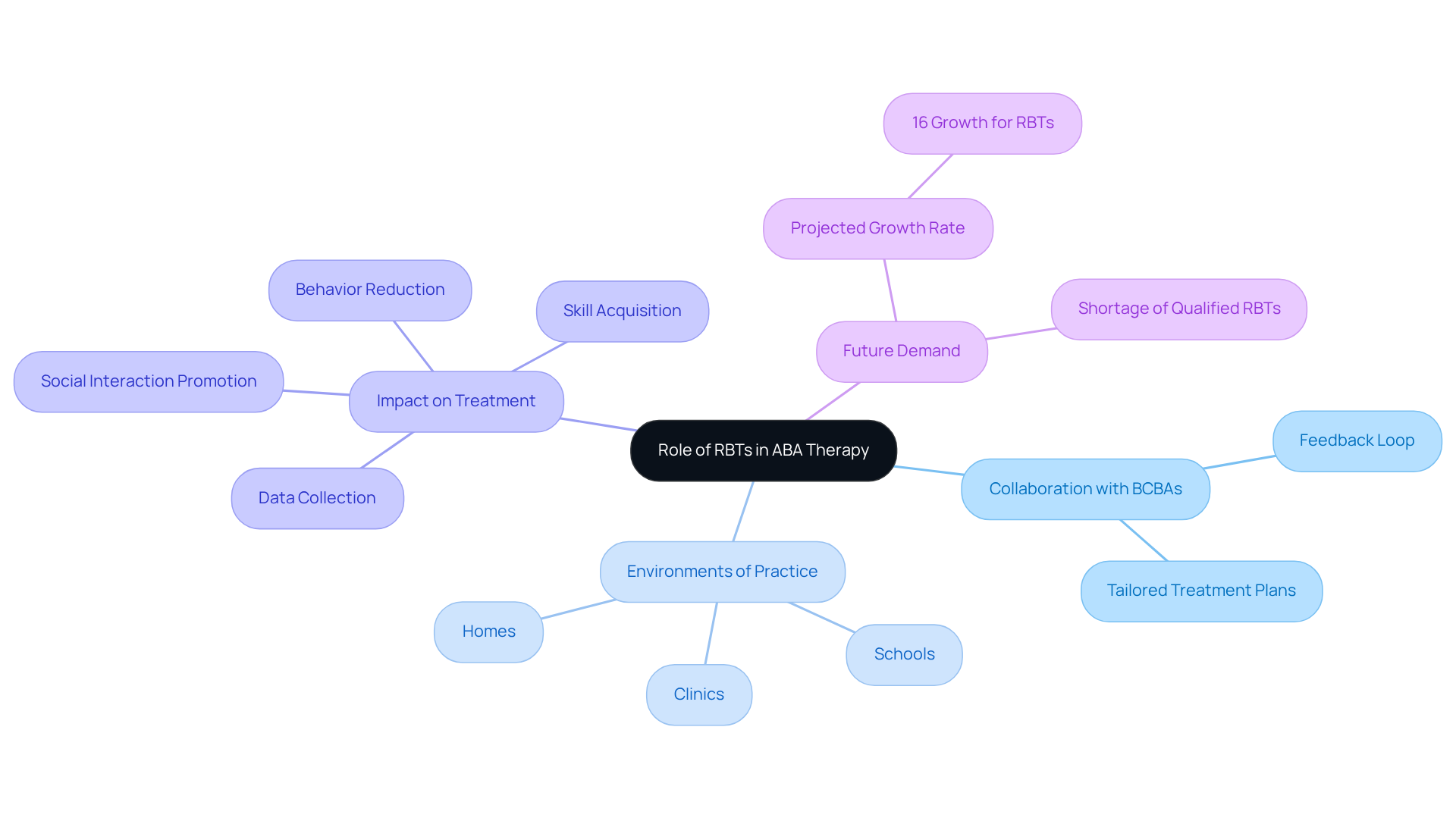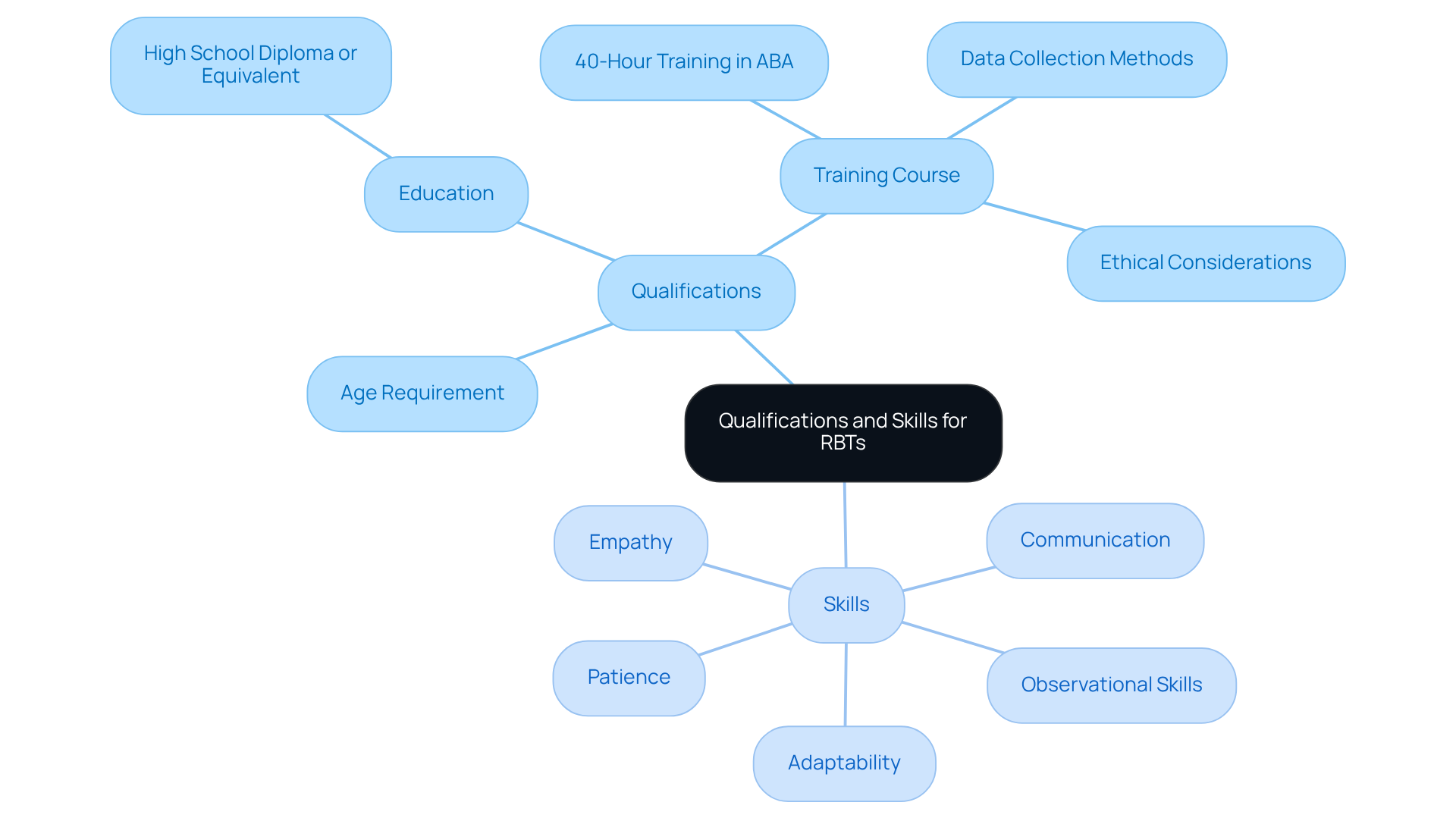August 27, 2025

The role of a Registered Behavioral Technician (RBT) is paramount in Applied Behavior Analysis (ABA). RBTs deliver direct services under the supervision of Board Certified Behavior Analysts, implementing intervention plans designed to enhance the skills of individuals, particularly those with autism. This crucial function is further underscored by evidence demonstrating that RBTs significantly contribute to improved behavioral outcomes.
Data reveals substantial progress in clients' skills and a marked reduction in disciplinary issues within educational settings. Such outcomes highlight the vital role RBTs play in fostering supportive learning environments. As the demand for skilled professionals in this field continues to rise, the importance of RBTs cannot be overstated.
The escalating demand for registered behavioral technicians (RBTs) underscores their essential role in the field of Applied Behavior Analysis (ABA). These trained professionals are not merely implementers of intervention plans; they are catalysts for significant improvements in the lives of individuals facing developmental challenges, especially those with autism. As educational institutions and organizations strive to enhance their behavioral support systems, a critical question emerges: how can RBTs effectively bridge the divide between theoretical knowledge and practical application to achieve better outcomes for their clients? This inquiry not only highlights the importance of RBTs but also emphasizes the need for a reliable recruitment solution, such as Hire ABA, to connect these professionals with the opportunities they need to thrive.
The demand for registered behavioral technicians has surged, reflecting their crucial role in Applied Behavior Analysis (ABA). A paraprofessional with specialized training and certification, a registered behavioral technician is dedicated to delivering direct services under the guidance of Board Certified Analysts. They execute intervention plans designed to enhance the skills and behaviors of clients, particularly those with autism spectrum disorder and other developmental challenges. The RBT certification, granted by the Behavior Analyst Certification Board (BACB), requires the completion of a 40-hour training course, passing a competency assessment, and adherence to ethical practice guidelines.
As of 2025, the need for registered behavioral technicians continues to rise, with numerous schools and organizations actively seeking to enhance their behavioral support capabilities. Registered behavioral technicians (RBTs) not only provide specialized expertise in behavior management but also significantly contribute to improving educational outcomes. For example, schools that have implemented comprehensive behavior support programs, inclusive of RBT services, have reported an average 42% reduction in office discipline referrals and a 38% decrease in suspensions, as noted by the National Education Association.
RBTs play an instrumental role in fostering collaboration among educational teams, enhancing communication between schools and families, and ensuring consistent behavioral interventions across various settings. Research indicates that students receiving consistent support from behavior technicians demonstrate 73% greater progress than their peers who do not receive such support. This underscores the essential function of registered behavioral technicians in cultivating , ultimately leading to improved outcomes for students with diverse needs.
Are you facing challenges in hiring qualified professionals for your educational institution? Consider the reliability and effectiveness of utilizing platforms like Hire ABA for recruitment. The expertise of RBTs is not just beneficial; it is essential for fostering an environment where every student can thrive.

Registered Behavioral Technicians (RBTs) play a crucial role in the success of Applied Behavior Analysis (ABA) therapy, collaborating closely with Board Certified Behavior Analysts (BCBAs) to execute tailored treatment plans. Their presence is particularly crucial in diverse environments such as schools, clinics, and homes, where they provide direct support to individuals. RBTs facilitate skill acquisition, reduce challenging behaviors, and promote positive social interactions, playing a pivotal role in the therapeutic process.
By meticulously collecting data on participant progress, RBTs deliver valuable insights that inform BCBAs about the effectiveness of interventions. This feedback loop allows for the , ensuring that each intervention is tailored to meet the unique needs of individuals. The impact of RBTs on individual outcomes is profound; research indicates that their involvement can lead to significant improvements in behavioral and social skills, thereby enhancing the overall quality of life for those receiving ABA therapy. According to the Bureau of Labor Statistics, the demand for ABA support services is on the rise, with an anticipated growth rate of 16% for registered behavioral technicians, underscoring their increasing importance in the field.
Consider a notable case where a child diagnosed with autism exhibited remarkable progress after receiving consistent support from a registered behavioral technician, who utilized strategies aimed at enhancing communication and social engagement. This example underscores how RBTs contribute to meaningful advancements for individuals, highlighting their vital role within the ABA support team.
Are you facing challenges in hiring qualified RBTs? Reflect on how Hire ABA can streamline your recruitment process and connect you with skilled professionals who can make a difference.

The key responsibilities of a registered behavioral technician encompass several vital functions in the realm of Applied Behavior Analysis (ABA) therapy.
Collaboration through regular communication with BCBAs and other team members is essential for registered behavioral technicians. They discuss client progress and work together on essential modifications to treatment plans, ensuring a unified strategy for care.
The effectiveness of behavior intervention strategies employed by registered behavioral technicians is emphasized by data showing that ABA practices can enhance social skills, communication, and academic performance in up to 90% of children with autism spectrum disorder (ASD) (Behavior Analyst Certification Board). Furthermore, case studies reveal that these professionals play a pivotal role in enhancing emotional regulation and coping skills among children, demonstrating the profound impact of their work in the field of behavioral health. For example, one study emphasized that ABA therapy efficiently teaches a broad array of skills in 90% of instances, underscoring the significance of registered behavioral technicians in attaining favorable therapy results.

To become a registered behavioral technician, candidates must meet that reflect the demands of the field. Consider the growing need for skilled professionals in behavior analysis. Candidates must:
Once the training is complete, candidates must pass a competency assessment conducted by a Board Certified Behavior Analyst (BCBA) to demonstrate their ability to perform RBT tasks effectively. This step is crucial in ensuring that registered behavioral technicians are fully prepared to meet the needs of clients.
Successful RBTs exhibit strong observational skills, patience, empathy, and effective communication abilities. They must also be adaptable and capable of working collaboratively within a team environment. These skills are vital for building rapport with clients and implementing interventions successfully.
Are you facing challenges in hiring qualified registered behavioral technicians? Consider how Hire ABA can streamline your recruitment process and connect you with the best candidates in the field.

The role of a Registered Behavioral Technician (RBT) is pivotal in the landscape of Applied Behavior Analysis (ABA) therapy, serving as a critical link between clients and the specialized strategies designed to foster growth and development. RBTs not only implement tailored intervention plans but also significantly contribute to the overall success of behavioral programs, ensuring that individuals with developmental challenges receive the consistent support they need to thrive.
Key insights into the responsibilities and qualifications of RBTs highlight their essential functions. From executing behavior plans and collecting crucial data to providing direct support and monitoring behaviors, RBTs enhance the quality of life for those they serve. The increasing demand for RBTs underscores their importance in educational and therapeutic settings, where their expertise leads to measurable improvements in client outcomes.
Reflecting on the significance of RBTs, their contributions extend beyond individual interactions; they foster collaboration among educational teams and families, creating a cohesive support system for clients. As the need for qualified professionals in this field continues to grow, prioritizing the recruitment and training of RBTs becomes imperative. Embracing this opportunity can lead to transformative results for students and individuals seeking support in their behavioral health journeys.
What is a Registered Behavioral Technician (RBT)?
A Registered Behavioral Technician (RBT) is a paraprofessional with specialized training and certification who delivers direct services in Applied Behavior Analysis (ABA) under the supervision of Board Certified Analysts. They implement intervention plans to enhance the skills and behaviors of clients, particularly those with autism spectrum disorder and other developmental challenges.
What are the requirements to become an RBT?
To become a Registered Behavioral Technician, an individual must complete a 40-hour training course, pass a competency assessment, and adhere to ethical practice guidelines set by the Behavior Analyst Certification Board (BACB).
Why is the demand for RBTs increasing?
The demand for RBTs is increasing due to their crucial role in enhancing behavioral support capabilities in schools and organizations, particularly as the need for effective interventions for individuals with developmental challenges continues to rise.
How do RBTs contribute to educational outcomes?
RBTs contribute to educational outcomes by providing specialized expertise in behavior management, which has been shown to lead to significant reductions in office discipline referrals and suspensions. Schools with RBT services reported an average 42% reduction in discipline referrals and a 38% decrease in suspensions.
What impact do RBTs have on student progress?
Research indicates that students who receive consistent support from RBTs demonstrate 73% greater progress compared to their peers who do not receive such support, highlighting the essential role of RBTs in fostering inclusive and supportive learning environments.
How do RBTs facilitate collaboration in educational settings?
RBTs play an instrumental role in fostering collaboration among educational teams, enhancing communication between schools and families, and ensuring consistent behavioral interventions across various settings.
What recruitment solutions are available for hiring RBTs?
Educational institutions facing challenges in hiring qualified RBTs can consider utilizing platforms like Hire ABA, which specialize in recruitment for behavioral support professionals.
Our expert recruitment strategies and AI-driven sourcing ensure that you receive top-notch candidates quickly, without compromising on quality. Whether you’re looking for BCBAs, Clinical Directors, or RBTs, we’ve got you covered.